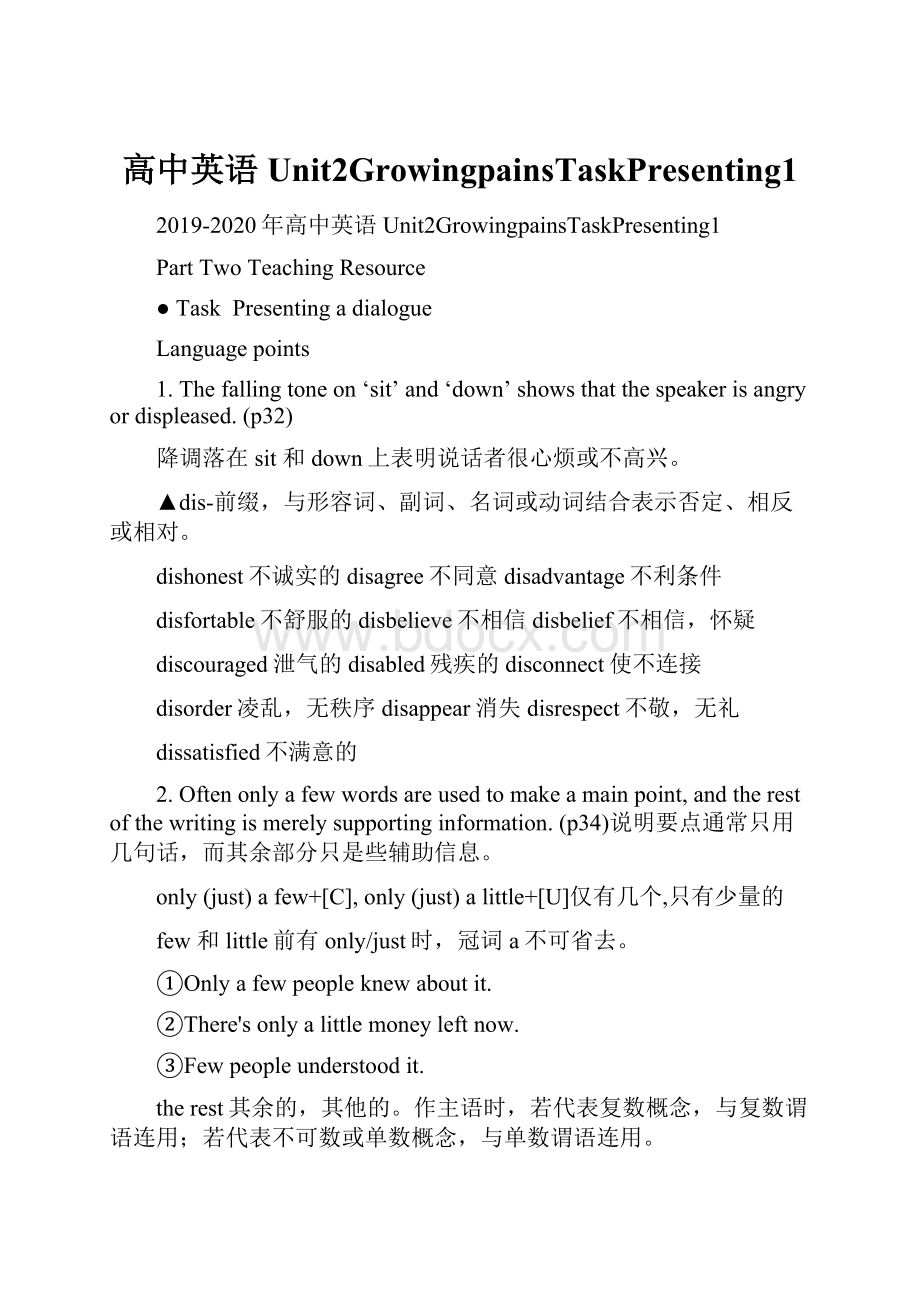高中英语Unit2GrowingpainsTaskPresenting1.docx
《高中英语Unit2GrowingpainsTaskPresenting1.docx》由会员分享,可在线阅读,更多相关《高中英语Unit2GrowingpainsTaskPresenting1.docx(15页珍藏版)》请在冰豆网上搜索。

高中英语Unit2GrowingpainsTaskPresenting1
2019-2020年高中英语Unit2GrowingpainsTaskPresenting1
PartTwoTeachingResource
●TaskPresentingadialogue
Languagepoints
1.Thefallingtoneon‘sit’and‘down’showsthatthespeakerisangryordispleased.(p32)
降调落在sit和down上表明说话者很心烦或不高兴。
▲dis-前缀,与形容词、副词、名词或动词结合表示否定、相反或相对。
dishonest不诚实的disagree不同意disadvantage不利条件
disfortable不舒服的disbelieve不相信disbelief不相信,怀疑
discouraged泄气的disabled残疾的disconnect使不连接
disorder凌乱,无秩序disappear消失disrespect不敬,无礼
dissatisfied不满意的
2.Oftenonlyafewwordsareusedtomakeamainpoint,andtherestofthewritingismerelysupportinginformation.(p34)说明要点通常只用几句话,而其余部分只是些辅助信息。
only(just)afew+[C],only(just)alittle+[U]仅有几个,只有少量的
few和little前有only/just时,冠词a不可省去。
①Onlyafewpeopleknewaboutit.
②There'sonlyalittlemoneyleftnow.
③Fewpeopleunderstoodit.
therest其余的,其他的。
作主语时,若代表复数概念,与复数谓语连用;若代表不可数或单数概念,与单数谓语连用。
①Therestoftheclassareagainsttheplan.
②I'11takemyshare
andtherestofthemoneyisyours.
③Therestofyourpositionisokay.
3.AllthatworryingIdidwasfornothing.(p34)我白担心了。
Idid为省略了关系代词that的定语从句。
fornothing[习]1)withoutpayment,free:
Childrenunder5cantravelfornothing.2)withnorewardorresult;tonopurpose徒劳Allthatpreparationwasfornothingbecausethemeetingwascalledoff.
4.Ididn'tfailmymathstestafterall,MissXumixedupmyresultswithsomeoneelse's.(p34)
我数学考试归根到底没有不及格,徐老师把我的成绩与别人的成绩搞混了。
afterall1)inspiteofwhathasbeensaid,doneorexpected毕竟,终究,竟然(大都放于句末)IthoughtIwasgoingtofailtheexam,butIpassedafterall.Shethoughtitwasadiamondnecklace,butitwasn'tarealoneafterall.2)itshouldberemembered别忘了,毕竟(多数情况用于句首)Youshouldbeproudofhim,afterall,heisjustachild.
5.IcalledyourradioshowlastweektoaskforyouradviceaboutaproblemmymumandIhad.(p35)
上周我给你们的广播节目打了电话,就我和我妈之间存在的问题征求您的竟见。
advice[U]劝告,忠告,建议advisev.
apieceofadvice—条建议
givesbadviceon…就……给某人提建议
askforone'sadvice征求某人的意见
take/followone'sadvice听从某人的建议
advisedoing建议做
advisesb.todo建议某人做
advisethat…(should)do建议……
①CanyougivemesomeadviceonhowtostudyEnglish?
②Heaskedformyadviceonreformingteachingmethods.
③Ifyoutakemyadvice,you'llsurelysucceed.
④Itisfoolishofhimnottofollowhisfather'sadvice.
⑤TheadvicehegavemewasthatI(should)takemedicaladvice.
⑥Iadvisestartingearly.
⑦Hewasadvisedtogiveupsmoking.
6.What'sup,Mum?
(p36)出了什么事,妈妈?
What'sup?
常用于非正式文体,相当于What'shappening?
/What'sthematter?
意为“出了什么事(不寻常或不愉快之事)?
”即表示“发生,进行”之意。
①What'sup?
Whyaretheycrying?
②Iknewsomethingwasupbythelookontheirfaces.
7.I'msorry,butyoumustgetittidiedupbeforeyougoouttoday.(p36)
对不起,今天在你出去之前你必须先把房间整理好。
getittidiedup为get/havesth.done结构。
tidy
adj.1)安排或排列整齐的atidyroom/desk2)爱整齐的,有整齐习惯的atidyboyv.使整齐You'dbettertidytheroom(up)beforetheyarrive.Tidyyourtoysawaywhenyoufinishplaying.Shetidiesoutthecupboardonceaweek.
英语中有很多形容词可直接转换成动词,最常见的有:
adj.v.adj.v.
clean干净的---弄干净;slow慢的---变慢,使慢
empty空的----倒空warm温暖的---使暖和
clear洁净的----清理right正确的----改正
dirty脏的-----弄脏free自由的----使自由
better较好的----改善busy忙碌的---使忙碌
8.Don'tyoutalktomelikethat!
(p36)你不要那样跟我说话!
▲该句为含有主语的祈使句。
祈使句通常不出现主语,用来表示请求、命令、号召、建议、祝愿或叮嘱等。
但有时为了强调、对比或表示说话人发怒、生气等感情,或仅仅为了明确指出是向谁提出请求或命令,主语可表示出来。
①Lili,youcleanthedoorandWugang,youtidythecupboard.
②Johnstandandtherestofyousitdown.
③Youbequiet!
④Everyonesitdown,please!
⑤Don'tyouforgettobringthekey.
⑥Don'tyoubecareless.
相关高考试题(NMETxx)
-Sorry,Joe,Idon'tmeanto…
-Don'tcallmeJoe.I'mMr.Parkertoyou,and____youforgetit!
A.doB.didn'tC.didD.don't
该题考查带主语的祈使句。
该句中否定祈使句加了主语you,加强了说话者不满的语气。
答案:
D
9.Mmn,twohourswon'tmakeabitofdifference.(p36)妈,过两个小时再干不也一样吗?
won'tmakeabitofdifference=willmakenodifference产生不了什么差别/造不成任何影响。
difference前可加no,some,much,little等修饰。
makeadifference产生差别;造成影响;起重要作用
①Itmakesadifferencewhichyouchoose.
②Yourhelpwillcertainlymakeadifference.
③Itmakesnodifferencetomewhetherhegoesornot.
④Asadayortwomakeslittledifference,wewillstarttogetherthismorning.
⑤Weshouldmakeadifferencebetweenrightandwrong.
10.ButIdon'tthinkyouarebeingfairatall.(p36)但是我认为你这样一点都不公平。
Idon'tthink…该句使用了否定转移。
除think外,believe,suppose,feel,see,expect,imagine等表示个人见解的动词也可作此用法,即将宾语从句的否定形式,转移到主句上述动词之前。
上述情况下若主句主语为第一人称,后跟反意疑问句时,应针对从句进行反问,且把not考虑在内。
Note:
(1)didn'tthink有时表示“没有料到”之意。
(2)hope,say,tell,guess等后跟宾语从句时一般不存在否定转移现象。
①Idon'timaginehe'llenjoyit.
②Idon'tthinkyou'reintheright.
③Idon'texpectshe'lle.
④Idon'tbelievehe'sathome.
⑤Idon'tthinkheishappy,ishe?
⑥Idon'tsupposethathecares,doeshe?
⑦MrsBlackdoesn’tbelievehersonisabletodesignsdigitalcamera,doesshe?
⑧Ididn'tthinkyouwouldbesolate.
⑨Ihopeyouweren'till.
⑩Hesaidthatshewouldn'te.
arebeingfair使用了be的现在进行时。
系动词be一般不使用进行时,但当需要表达某种特殊含义(如短暂性,临时性、转义等)时,也可使用进行时。
①Heisrude.他很粗鲁。
(长久性)
②Heisbeingrudetoasksuchaquestion.他问这样的问题很粗鲁。
(暂时性)
③Theyarefriendly.他们很友好。
(长久性、事实)
④Theyarebeingfriendly.他们显得很友好。
(一时性,表现出来的)
能与be的进行时连用的只是某些动态形容词,如:
angry,careful,careless,clever,foolish,generous,kind,brave,stupid,rude,polite,thoughtful等。
而big,small,tall,dirty,1arge等静态形容词则不能与be的进行时连用。
11.Whatdidtheydotofixtheirproblem?
(p37)他们是怎样解决他们的问题的?
fixv.
①Thetablewasfixedtothefloor.(固定,安装)
②Let'sfix(up)adateforthemeeting.(确定,决定)
③Hefixedhiseyesontheperson.(定睛看,集中注意力于)
④Hiscarhasbrokendown.Hehastohaveitfixed.(修理,调整)
⑤Whynotfixyourroomnow?
(整顿,整理)
12.Whatisthenewsituationlike?
(p37)现在的情形怎么样?
Whatis…like?
……怎么样?
like为介词,what是其宾语。
①What'stheweatherliketoday?
今天天气怎么样?
②-Whatishelike?
-Heisn'tagood-lookingmanbutheisverykind-hearted.
[c.f.]situation,state,condition
situation局面,状况,形势,境地,主要指各种情况间的相互关系以及与有关人之间的关系,即强调相互间的联系和影响。
theinternationalsituation国际形势thepoliticalsituation政治局面thepresentsituation目前形势
state状态,状况,只有单数形式,常与a连用,说明某一种状态或状况,与介词in搭配使用。
condition条件,状况,常用于短语:
ingood/poor/etc.condition状况好/坏等。
(be)inaconditiontodo适宜于做beinnoconditiontodo不适宜做in/outofcondition身体好/欠佳
①Howshouldwefacetheworseningsituation?
②ThesituationinAmericaisthesame.
③Sheisinagoodstateofmind.
④Atthattime,thewholecountrywasinastateofwar.
⑤Heisinnoconditiontotravel.
⑥Theconditionofhishealthpreventedhimfromworking.
⑦I'vehadnoexerciseforages.I'mreallyoutofcondition.
⑧Allthegoodshavearrivedingoodcondition.
2019-2020年高中英语Unit2GrowingpainsTaskPresenting2
Aimsandrequirements
♦ReadaplayaboutanAmericanfamilyandtwoletters
♦Listentoaradiotalkshow
♦Talkaboutproblemsmontoteenagers
♦Presentadialogue
♦Writeanadviceletter
procedures
●TaskPresentingadialogue
Skillsbuilding1:
understandingtonesinspokenEnglish
Inthispartyouwillreadabouthowtoexpressdifferentfeelingsindifferenttones.Bylisteningtooneshortsentenceindifferenttonesandreadingtheexplanationaftereachsentence,you’lllearnpeoplespeakindifferenttonestoexpressdifferentfeelings.Listentoanothersentenceindifferenttonestodecidewhichemotionalmeaningeachtoneshows.
1.ReadtheguidelinesinSkillsbuilding1onpage32beforelisteningtothefiveversionsofthesamesentenceindifferenttones.Youwillseethattherearefourmainpointstodeterminehowthespeakerisfeeling.(Writedownthefourpointsontheblackboard.)
*thevolume*thetones*stressedwords*thepause
2.Listentotheexamplesentenceinfivedifferenttonesonebyone.Afteryoulistentooneofthem,tellwhatyouthinkaboutthespeaker'semotion.Isshehappy,orangry?
Issheinhighspiritsorinlowspirits?
Thenreadtheexplanationforeachsentence.
3.Readthesentence‘Hewilleheretomorrow.’indifferentemotions.
Ifsomeoneishappyabouthising,
Ifsomeonedoesn'twanthimtoe,howwillhespeakit?
Inwhattone?
Ifsomeoneisexcitedabouthising,
Ifsomeoneisfrustratedorquestioning,
Thenlet’slistentothetapeandfinishPartAonpage32.
Tapescript
(1)Hetoldmethetesthadbeenputoff?
(Questioning,asifshedoesnotbelievethatthetestcouldhavebeenputoff.)
(2)Hetoldmethetesthadbeenputoff!
(Frustrated,asifshehadgonetothetestroombeforerememberingthatshehadbeentoldaboutthecancellation.)
(3)Hetoldmethetesthadbeenputoff!
(Excited,asthoughheisgladnottohavetotakethetest.)
(4)Hetoldmethetesthadbeenputoff.
(Sad,asifshewaslookingforwardtotakingthetest.)
Answers
A1.questioning2.frustrated3.excited4.sad
4.AskstudentstolistentothetapeandfinishPartB.
Letstudentslistentothefivesentencesagainandaskthemtotellwhichwordisemphasizedandwhattonesareusedfordifferentemotions.
Tapescript
Hetoldmethetesthadbeenputoff.
(Sheneitherlikesnortrustshim.Shemaywishsomeoneelsehadbeentheonetotellher.)
Step1:
listeningtoaradiophone-inprogramme
Inthisprogramme,sixteenagerscallthehosttotalkabouttheirproblemsandaskforsomeadvice.Writedownapropernamebeloweachpictureaccordingtowhatyouhearfromthetape.
Listentoaradiophone-inprogrammeandfinishtheexerciseinStep1onpage33.Saysomethingaboutthepicturesandwhatyouhaveheardonthetape.
Tapescript
Host:
Weleto‘Talktime’.ThisisGeorge.Tellmeyournameandproblem?
Caller1:
MynameisChristinaandI'mcallingaboutmymum.Shecriesallthetimeandsayswedon'tspendtimetogetherandthatIdon'tloveher.Idoloveher,butIalsohavet